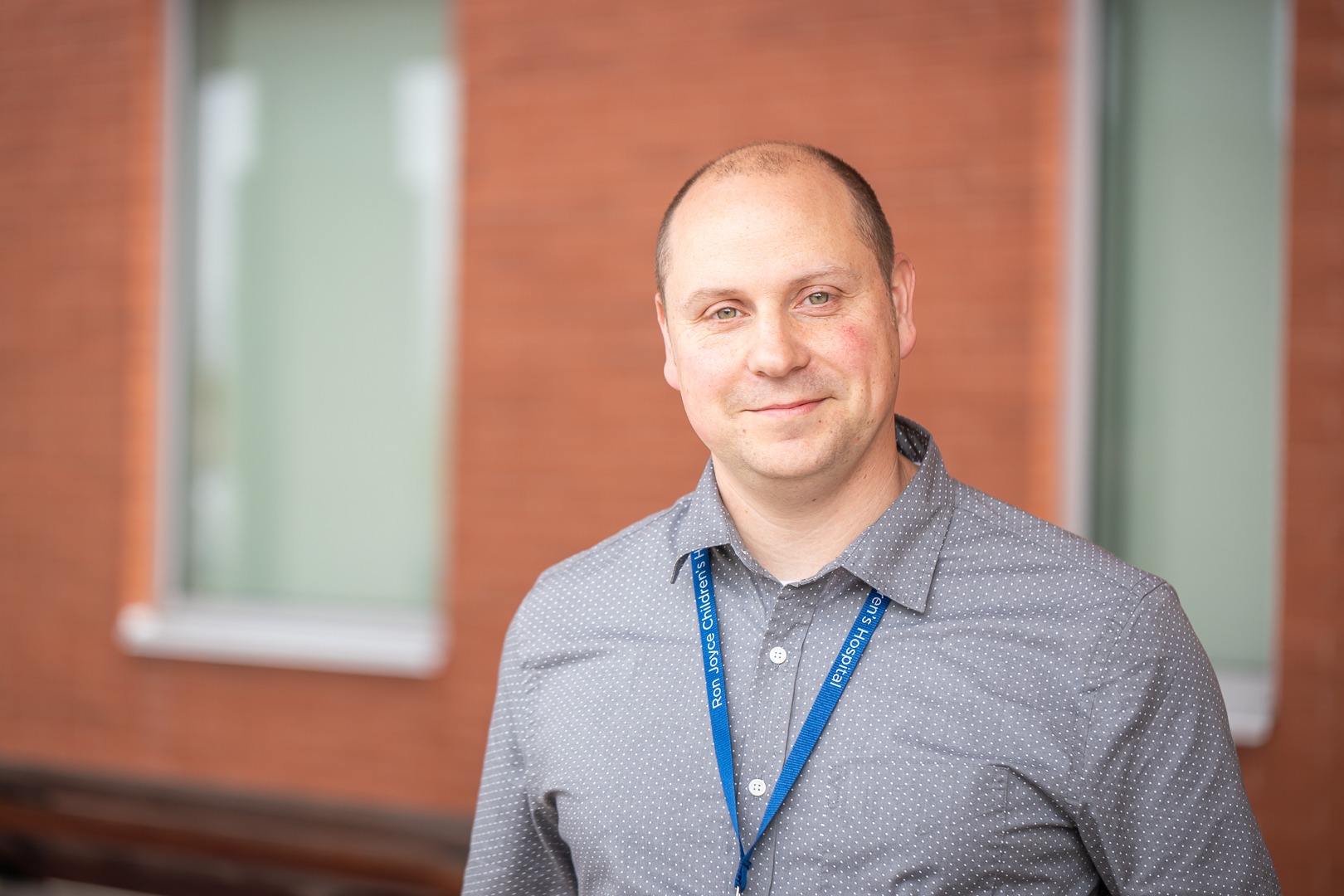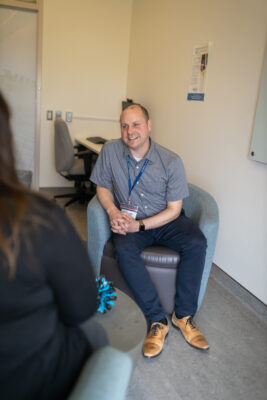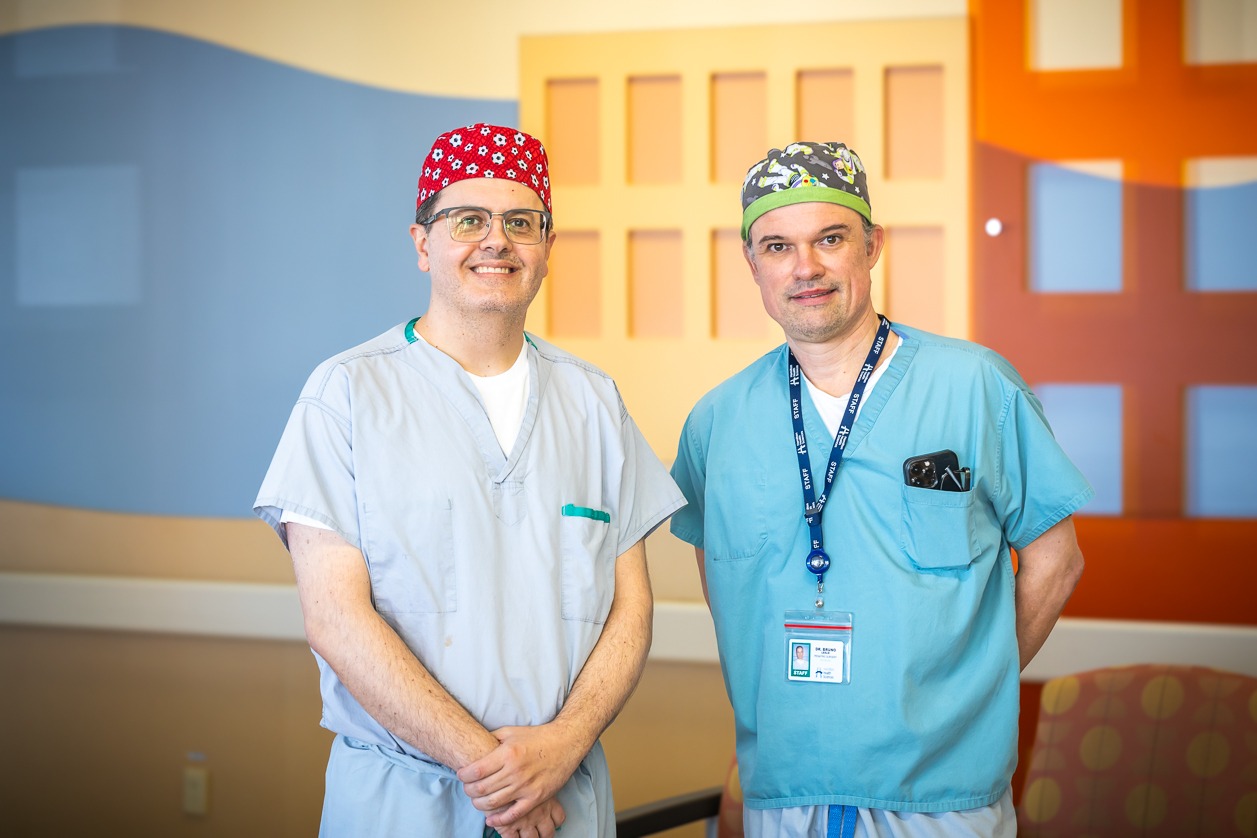
Supporting teens with complex mental health needs in the digital era
*Trigger Warning// self-harm, assault and suicidality
*Pseudonyms have been used to protect the identity of the child and family.
As a young girl, Jane Doe*’s daughter, Mary, struggled to connect with her peers and make close friends. What came across as a shyness phase continued to grow with increasing issues of anxiety for Mary. While in middle school, Mary came to her mom one day with a cut she had made on her thigh. Jane and her husband knew they needed to seek help.
Jane called several places for mental health support, finding long waiting lists everywhere, including Hamilton Health Sciences’ McMaster Children’s Hospital (MCH). Fortunately, the family was able to access private therapy funded by their work benefit plan – an option not available to everyone.
By the time Mary was in high school, the COVID-19 pandemic had begun, and her mental health situation worsened. Self-harm continued, now with deeper cuts, sometimes leaving scars. She became involved with a boy who convinced Mary that her family’s basic rules were abusive, which led to a crisis involving police. Mary was taken to the MCH emergency department, where she was admitted to the child and youth mental health unit.
Investing to support adolescent mental health
When children or youth experience harm or are at risk of harming themselves or others, they often have complex mental health issues. This usually results in overnight stays in the hospital when in crisis. Regardless of how long a child or youth may stay in the hospital, ongoing individual and family support and treatment is essential.
As Ontario’s largest adolescent mental health program, MCH’s Child and Youth Mental Health Program provides mental health services to meet the needs of the patient and also offers support for the patient’s entire family.
“Family therapy taught us skills and tools that work when you apply them.”
Thanks to a historic provincial investment of more than $48 million in 24 programs at MCH, including the mental health program, the hospital has been able to grow spaces, services, and staff to improve care. A new clinical specialist role was created to support children with complex mental health needs and their families. That role was filled by social worker Zeb Demaiter, who recently joined an expert team of staff and physicians.
“Once home from an inpatient stay at MCH, families struggle to maintain stability and to get the progress they need from treatment,” says Demaiter. “We look at how we can help further stabilize family home environments by working more closely with caregivers around the unique needs that aren’t as easily met with the standard approaches we have available.”
A long road of ups and downs
The continual lure of connection and validation on social media platforms has resulted in a significant impact on Mary’s mental health and physical safety, with many ups and downs on her journey to mental health stability, culminating in several crises over six months last year.
When she wanted money, Mary posted on social media that she wanted a job. She then became involved with online cheque fraud, attempting to deposit a fake cheque and then returning a portion.
On one occasion, she was blackmailed by people with whom she shared intimate photos and videos who threatened to send her images to family members. Another time, she entrusted a ‘friend of a friend’ with her password to find that he logged in to her account and shared images live while she watched in horror, unable to stop it. The family pressed charges. During this period, Mary also experienced a sexual assault after an in-person meeting with someone she originally met online.
In crisis, Mary returned to MCH for inpatient care, with her parents struggling for solutions.
The MCH team pursued additional psychological testing to delve deeper into Mary’s ability to make decisions and found that she also has attention-deficit/hyperactivity disorder (ADHD) and non-specified personality disorder which makes self-regulation, coping with emotions, thinking before acting, and learning from consequences more difficult for her.
Unprecedented times for teens and their mental health
 Demaiter has observed increased numbers of teens and pre-teens struggling at a younger age with suicidal behaviour, substance abuse, and connection to high-risk online relationships making the monitoring of these issues dramatically more complicated. He attributes this to multiple factors that have put stress on children’s mental health in a way that experts are trying to understand.
Demaiter has observed increased numbers of teens and pre-teens struggling at a younger age with suicidal behaviour, substance abuse, and connection to high-risk online relationships making the monitoring of these issues dramatically more complicated. He attributes this to multiple factors that have put stress on children’s mental health in a way that experts are trying to understand.
“Parents are parenting kids who are living in a culture that uses technology to connect in a way that is not the same as how they grew up,” says Demaiter. “We know that in addition to the potentially harmful effects from some of these technologies, we also have a generation of kids and teens who lived through COVID and isolation in a way that we could never have understood before it happened.”
Therapy focuses on family strengths
One treatment approach that Demaiter uses is emotion-focused family therapy (EFFT), a way that parents can engage with youth around their emotional difficulties, to help guide the youth through those problems towards recovery or change.
“The evidence tells us the more that a parent feels empowered to assist their child to process their emotions and the more confident they can feel about how to help support their child with recovery, the faster their child can get better,” said Demaiter.
In addition to EFFT, Demaiter uses family check-up and other approaches to family therapy to support caregivers. In combination, this offers a family-centred approach that focuses on family strengths. It helps everyone understand and support each other by using practical strategies to improve communication and set healthy and supportive boundaries within the family.
“It’s not perfect, but I definitely think that our relationship has become a lot better by knowing how to support her.”
Jane says she and her family found family therapy very helpful.
“We would talk on our own while staff observed,” she says. “They would return and share their feedback, always in a positive manner, always highlighting what was beneficial for us to continue. It just helped facilitate conversation, helped my daughter open up to us, and helped us understand and take a step back and realize the type of support that she needs.”
Through therapy at MCH, Jane and her family came to see Mary’s behaviour in a new light and received tools to support her.
“What became apparent to us is that what may have seemed like bratty behaviour was related to her diagnoses of depression, social anxiety and mild OCD,” she says. “Family therapy taught us skills and tools that work when you apply them. We learned what language to use with our daughter. It’s not perfect, but I definitely think that our relationship has become a lot better by knowing how to support her.”
Working together to support young people at risk
The MCH team felt that Mary was at significant risk for sex trafficking. With the family’s consent, they presented her file to a community meeting with representation from local Children’s Aid, Hamilton Police Service, the YMCA and other community organizations.
As a result, Mary had the opportunity to participate in meetings and programming to empower her and provide her with resources to assist in navigating difficult topics such as human trafficking, guns and gangs, and drugs.
Another valuable program for Mary was the mental health day-treatment program MCH’s Ron Joyce Children’s Health Centre (RJCHC). Mary was one of a small group of six to eight teens who were able to take courses and earn high school credits while learning mental health tools and other life skills, including grocery shopping with a staff member.
A plan to manage online safety
With Mary nearing adulthood, her parents are deeply concerned about managing and allowing their daughter access to technology.
“It’s so triggering for me as a parent because I don’t want her to have access to technology. But then what happens when a child becomes an adult, and they’ve been limited? All of a sudden, they’re getting their freedom, and they’re acting out,” says Jane.
“Zeb was really key in helping us figure out a plan that we could all agree on.”
Demaiter was there to support the family in learning that the point isn’t to prevent Mary from ever having a phone, computer, or access to social media. The approach is to temporarily remove them until she has the skills to manage them successfully and safely. Jane says the support was extremely helpful.
“The big piece that we worked on together is how to navigate the use of electronics and give her some of her freedom safely,” she says. “Zeb was really key in helping us figure out a plan that we could all agree on.”
Hopeful for the future
The approaches the family and MCH team have put in place seem to work for the family.
“It took a long time to get to MCH, but I cannot stress how grateful we are to everybody involved. From the time we were connected, every single person we’ve been involved with has been amazing – the entire team works together,” says Jane.
“When things escalated last year, we were devastated. I am hopeful that a lot of that dangerous behaviour has subsided with all of the support she’s receiving and that we’ve received as a family. I think the work we have done has enabled us to navigate it together. Had we not had that support prior, I don’t know how much worse things would have become.”
Resources
If you or someone you know is experiencing a mental health crisis, call 9-1-1 or visit your closest emergency department.
These resources may be useful for those looking for mental health support:
- Are you in crisis? Crisis Response Programs
- YMCA Youth Services
- Kids Help Phone
- Cybertip.ca
- Canadian Centre for Child Protection: Keeping kids safe
- City of Hamilton: Mental Health Services for Children, Youth and their Families



